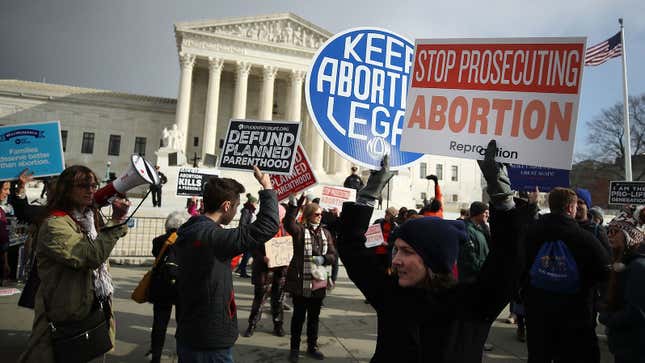

In the past several weeks, Republicans in Alabama, Missouri, and Georgia have pushed through a series of horrifying bills that effectively ban abortion and criminalize the procedure, a bald attempt to trigger a legal challenge with the hope of eroding or outright overturning Roe. While the bans are particularly extreme, the reality is that these bills, and others like them, are a culmination of a decades-long strategy to restrict abortion access in America—one that has already largely succeeded.
How did we get here? Carol Sanger, the Barbara Aronstein Black Professor of Law at Columbia Law School and author of About Abortion: Terminating Pregnancy in the 21st Century, traces the slow dissolution of Roe back to the 1992 Supreme Court case, Planned Parenthood v. Casey, in which the Supreme Court affirmed the basic right to an abortion, but expanded the state’s ability to intervene in abortion decisions from the moment of conception onwards in the name of protecting a woman’s health and the “potential life.” Roe established a right to abortion until the point of fetal viability, generally determined at 24 weeks of gestation. But Casey “made a new test,” allowing for regulations on abortion before fetal viability so long as the restrictions don’t create an “undue burden” on someone—a test that has been harder to meet in court.
“Everybody thought Casey was going to be the moment that was going to overturn Roe. Rather than overturn Roe, it dismantled Roe,” Sanger told Jezebel, noting that the decision opened up a new avenue of abortion restrictions, including mandatory ultrasounds and targeted regulations on providers. “It’s much harder to get an abortion now than it was prior to Casey,” Sanger said. “To a great extent, Roe has already been dismantled.”
“Freedom in the most intimate aspects of your life—family planning, family formation, reproduction—that becomes imperiled.”
Republicans see an opportunity under the Trump administration to push unconstitutional legislation forward with the hope that a conservative Court will take up Roe. But the Center for Reproductive Rights, which is challenging Georgia’s recent heartbeat bill, Missouri’s eight-week ban, and will challenge Louisiana’s six-week ban, if enacted, does not expect these bills to be enacted as law. “Legislators who are hostile to abortion rights see this as an opportunity to get a different answer to the same question,”Elisabeth Smith, Chief Counsel, State Policy and Advocacy at the Center for Reproductive Rights, told Jezebel. But “We fully expect that none of these six-week bans will ever be enforced. No six-week ban has ever been enforced.”
-

-

-

-

-

-

-

-

-

-

-

-

-

-

-

-

-

-

-

-

-

-

-

-

-

-

-

-

-

-

-

-

-

-

-

-

-

-

-

-








































